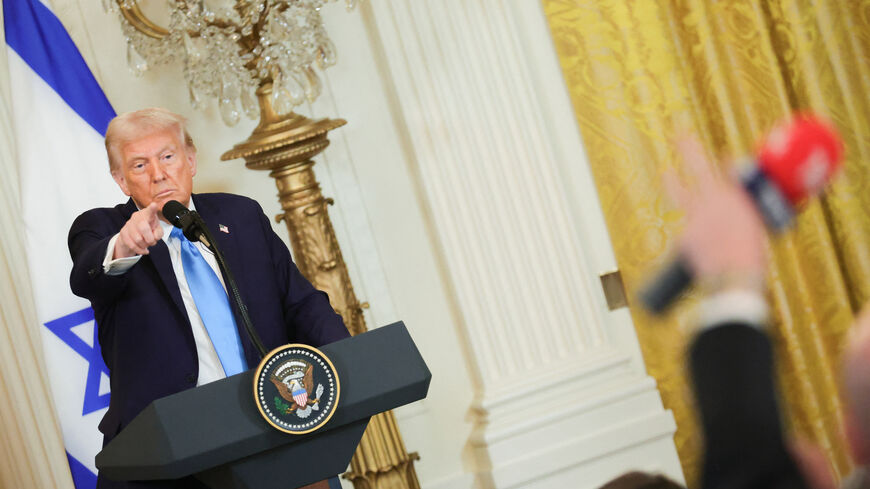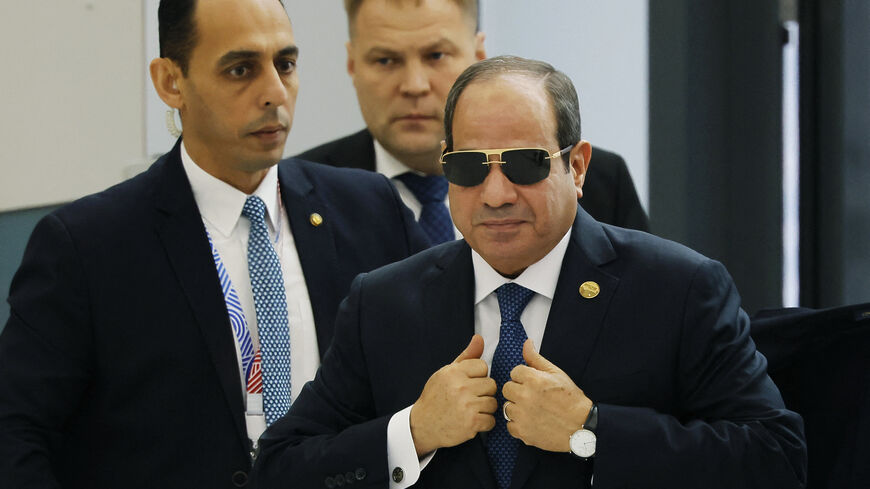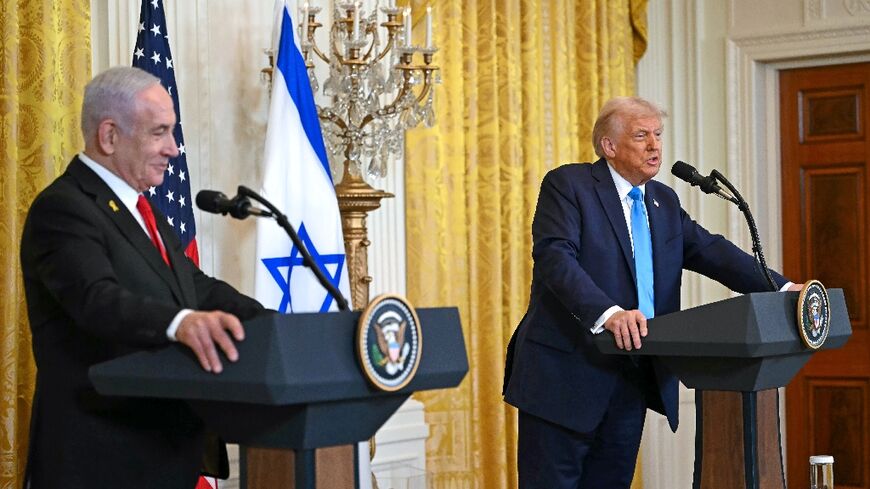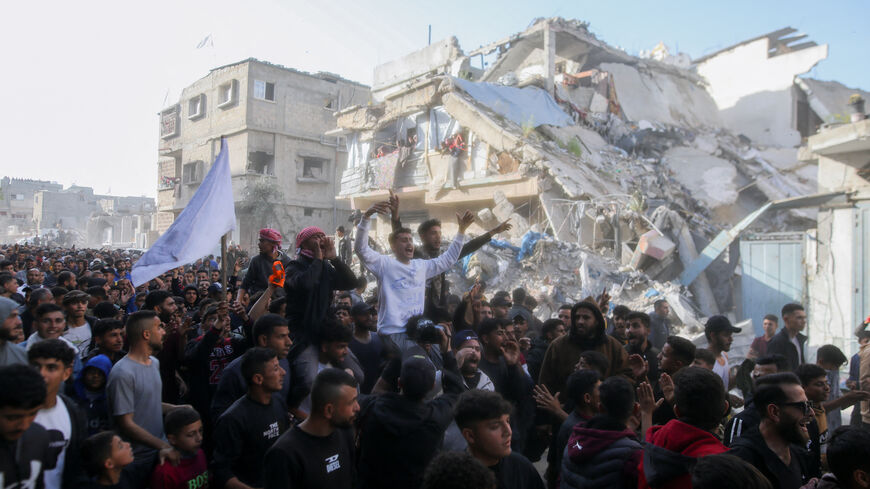'Death itself could not get us out of here!' Gazans reject Trump’s proposal
After suffering more than a year of death and destruction, Palestinians in Gaza stress they will not abandon their land, dismissing the idea floated by the US president to relocate them to neighboring Arab countries.
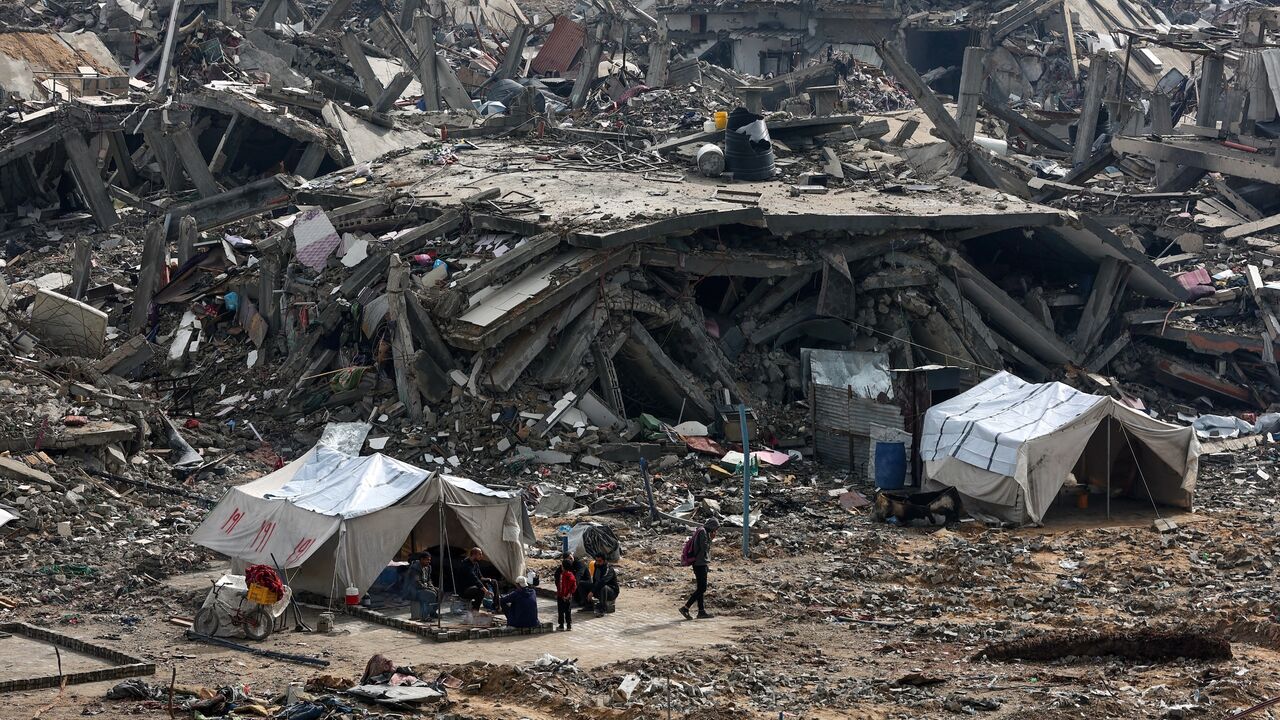
GAZA CITY, Gaza Strip — US President Donald Trump's idea to relocate Gaza residents to Egypt or Jordan has met with outright rejection from Palestinians. Displacement and population transfers have deep roots in the Palestinian struggle and collective trauma, and Trump’s comments have triggered sentiments always close to the surface.
Speaking to reporters on Jan. 26, Trump proposed that Egypt and Jordan take in Palestinians from Gaza, which he described as a “demolition site,” where “almost everything is demolished and people are dying.” He claimed that he had already made the request to Jordanian King Abdullah II and that he intended to discuss the idea with Egyptian President Abdel Fattah al-Sisi.
Trump said neighboring Egypt and Jordan could resettle up to 1.5 million Palestinians. “We are just cleaning this place completely,” he said, referring to Gaza, and asserted that the relocations could be temporary or long term.
Egypt and Jordan swiftly rejected the idea and reaffirmed their opposition to any forced displacement of Palestinians from their land.
Trump's statements came 15 months after the war between Israel and Hamas erupted after Hamas' attack on southern Israel on Oct. 7, 2023. The conflict, which ended with a ceasefire agreement on Jan. 15, left some 47,000 Palestinians dead from Israeli attacks, which also destroyed around 66% of the buildings in Gaza, according to a September 2024 report by the UNOSAT, the United Nations Satellite Centre.
Gazans defiant
When asked about Trump's proposal, Abdel Aziz Amr, from the Jabalia refugee camp, north of Gaza City, responded with a sarcastic smile.
“For 15 months, I have endured the bombing and destruction in the Jabalia camp during the genocide carried out by the Israeli army against us,” said Amr, now living in a tent in front of the rubble that used to be his home. “Despite everything, myself and many others have refused to move from the north of the strip to the south.”
He added, “After all of this suffering, do you think that I and these people will move to another country? Trump must realize that death itself could not get us out of here!”
In the Sheikh Radwan cemetery, west of Gaza City, Khadija Radwan sat at the graves of nine of her sons and grandchildren, all killed during the war. Dismissing Trump’s remarks, she told Al-Monitor, “Trump’s statements are worthless.”
Radwan said her children and grandchildren were killed in an Israeli airstrike that targeted their home in Sheikh Radwan because they insisted on remaining there. She added, “So we will stay in Gaza, no matter the cost, and we will not move anywhere else.”
Radwan and her surviving family members have found shelter in a camp for the displaced amid the ruins of the Yarmouk Sports Stadium, also destroyed by the Israeli army. “We will stay here and rebuild Gaza,” Radwan emphasized.
Trump’s remarks also sparked strong criticism from Palestinian analysts, who view them as both unrealistic and dangerous.
Talal Okal, a writer for the local newspaper Al-Ayyam, spoke to Al-Monitor, calling Trump’s statements absurd.
“[They] reflect his lack of understanding of the nature of the conflict,” he said. “[People in Gaza] are dying because they refuse to abandon their land or leave their homes, and they demand to return to their cities and lands that Israel took from them in 1948.”
Okal believes the transfer proposal, issued by the president of the most powerful country in the world, “will cause more suffering for the people of Gaza and will escalate tension and violence in the region.”
He called on Trump to be more cautious and realistic when making suggestions about the Israeli-Palestinian situation, because, he said, “The Israeli side will not hesitate to implement them as long as they serve its interests, especially when it comes to emptying the Gaza Strip of its residents.”
Indeed, far-right Israeli leaders swiftly announced their support for Trump's proposal to transfer the Palestinians out of Gaza. Finance Minister Bezalel Smotrich told reporters on Jan. 27 that he was working on an “operational plan” to turn it into an executable policy.
Hamas, Fatah reject displacement
Hamas, which still controls Gaza, rejected Trump’s proposal. “Trump’s statements about transferring the residents of Gaza to Egypt or Jordan are unrealistic and disconnected from the reality on the ground and reflect ignorance of the nature of the Palestinian people and their history of struggle,” Hamas spokesman Hazem Qassem told Al-Monitor. “These statements are rejected in their entirety, and cannot be accepted by our people, who reject displacement and cling to their legitimate rights to their land and homeland.”
Qassem further warned, “Attempts to liquidate the Palestinian cause through absurd proposals will fail, similar to previous failed proposals. We will remain steadfast in our land until we achieve our legitimate national aspirations.”
Qassem called on the international community to take a stand against statements “that encourage crimes of ethnic cleansing against our people.”
Similarly, Abbas Zaki, a member of Fatah’s Central Committee, warned against Trump’s proposal.
“These ideas are completely rejected, and the Palestinian people will not leave their land under any circumstances, despite the crimes and violations they are subjected to,” Zaki told Al-Monitor.
Zaki strongly criticized US policy toward Israel. “[It] not only supports the occupation [Israel] politically, but also provides it with lethal weapons that encourage it to commit more massacres against the Palestinians,” he said.

